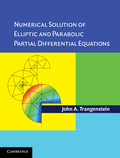Book contents
- Frontmatter
- Contents
- Preface
- 1 Introduction to Partial Differential Equations
- 2 Parabolic Equations
- 3 Iterative Linear Algebra
- 4 Introduction to Finite Element Methods
- 5 Finite Element Theory
- 6 Finite Element Approximations
- 7 Mixed and Hybrid Finite Elements
- 8 Finite Elements for Parabolic Equations
- 9 Finite Elements and Multigrid
- 10 Local Refinement
- Nomenclature
- References
- Author index
- Subject index
7 - Mixed and Hybrid Finite Elements
Published online by Cambridge University Press: 05 May 2013
- Frontmatter
- Contents
- Preface
- 1 Introduction to Partial Differential Equations
- 2 Parabolic Equations
- 3 Iterative Linear Algebra
- 4 Introduction to Finite Element Methods
- 5 Finite Element Theory
- 6 Finite Element Approximations
- 7 Mixed and Hybrid Finite Elements
- 8 Finite Elements for Parabolic Equations
- 9 Finite Elements and Multigrid
- 10 Local Refinement
- Nomenclature
- References
- Author index
- Subject index
Summary
Our discussion of conforming finite element methods in Chapters 4, 5 and 6 showed how to develop arbitrarily high-order numerical approximations for smooth problems. As we saw in Section 6.4.1, these numerical approximations were required to be continuous enough to be admissible in the weak form for the differential equation. In Céa's Lemma 5.5.1, we also saw that these conforming finite solutions consistently overestimate the strain energy in the true solution of the differential equation. This is an unfortunate consequence of the development of conforming finite element methods from energy minimization principles.
In this chapter, we will examine an alternative development that is based on finding extrema of energy functions subject to constraints. For example, we might rewrite a second-order differential equation as a system of two first-order equations. Both of the first-order equations will then be written in weak form. One of the equations will be treated as a constraint, and the other will be treated as an objective for which we want to find an extremum. In this process, we will find relaxed continuity conditions on the functions used to approximate the variables in the two first-order equations. Sometimes, these mixed finite element methods can generate very accurate numerical approximations for problems with rough coefficients. Unfortunately, the mixed methods lead to larger linear systems, and more difficult theoretical constraints on their proper application.
Information
- Type
- Chapter
- Information
- Publisher: Cambridge University PressPrint publication year: 2013
